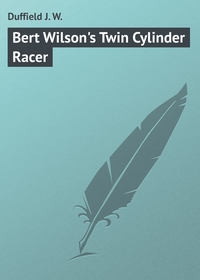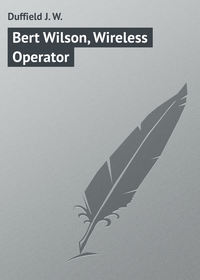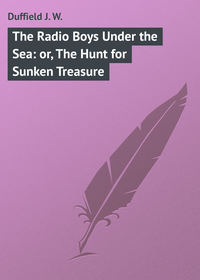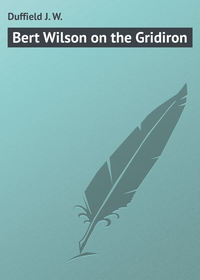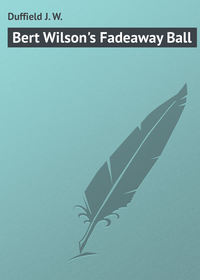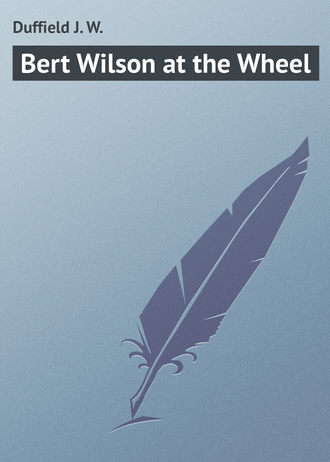 полная версия
полная версияBert Wilson at the Wheel
“That’s all very well,” said Jim, “but the question is, how are you going to do it? This isn’t exactly a flying machine, although it can go pretty fast, and it seems to me that we will need something like that to get us out of here.”
“Say, you ought to be ashamed of yourself, Jim Dawson,” exclaimed Tom, indignantly, “here you call yourself one of the crowd, and yet you are willing to give up before you have fairly begun to try. That isn’t the right spirit.”
“Oh, it’s easy enough to talk,” answered Jim, sulkily, “but I’d just like to know how you are going to do it, that’s all.”
“Well, I can’t say I have a plan right now, but I’m sure that our old ‘Red Scout’ isn’t going to leave us in the lurch now after all it has done so far,” and here he patted the vibrating car lovingly.
Meanwhile Bert had been thinking deeply, and had finally hit on a plan. “Here, some of you fellows, run back and bring me all the hay you can carry from that barn, will you? We want to get out of here as soon as we can, because Mr. Hollis will be anxious about us. Lively’s the word.”
Tom, Bob, and Frank ran back to the barn and soon reappeared, carrying armfuls of hay. When they reached the car Bert took charge of it, and placed it carefully under the rear wheels, and made a path in front of each wheel for about six feet.
“If we can only get over to the side of the road and up on that grass there,” he explained, “we will be on firmer ground and can get better traction. I only wish we had tire chains.”
“What are tire chains, Bert, and what are they for?” inquired Frank.
“Why, you see how it is,” replied Bert, “we have plenty of power, but the wheels can’t get a grip on the ground, and just skid around. If we had a network of chains over the tires they would bite through the mud to solid ground and get the grip we need. Understand?”
“Sure thing, and much obliged for the explanation,” said Frank, heartily.
By this time Bert had arranged things to his satisfaction, and now climbed into the driver’s seat, while the boys looked on expectantly.
Bert threw out the clutch, advanced the spark slightly, and opened the throttle a few notches. Immediately the motor increased its revolutions, and when it had reached a good speed Bert gently eased in the clutch. There was a grinding sound of clutch and gears as the power was transmitted to the rear wheels, and the “Red Scout” lunged forward.
The front wheels were so firmly embedded by this time, however, that even the “Red Scout” was helpless. Again and again Bert raced his engine and let in the clutch, and each time the machine made a gallant attempt to free itself, but could never quite make it. Finally he reversed, but with no better result. At last he gave up the attempt, and leaving the motor turning over slowly, descended to hold a consultation with the other boys.
“Have you any suggestions to make, fellows?” he asked, “I confess I’m up a tree just at present. What do you say, Bob? Can you think of anything?”
“Why, I was thinking,” answered Bob, flattered by this direct appeal to his vaunted experience, “that if we could dig out a path in front of the machine up onto the grass we might get it out that way.”
“Say! you’ve hit the nail on the head this time!” exclaimed Bert, enthusiastically. “That’s just what we’ll do. Get that spade out of the tonneau, will you Frank, and we’ll get to work.”
Frank immediately complied, and in an incredibly short space of time the boys had a path dug in front of the auto down to hard gravel, and were ready for another attempt to extricate their beloved car.
Bert climbed into his seat with a do-or-die expression on his handsome young face, and repeated his former tactics, but this time with greater success. The “Red Scout” surged forward with a roar, like some imprisoned wild creature suddenly given its liberty. Bert took no chances this time, but plugged steadily onward until he reached high, firm ground. Here he stopped the panting machine, and waited for the cheering boys to catch up.
They soon reached the faithful car, and quickly jumped into their places. Before starting again Bert turned around and said, “Fellows, I think we owe Bob a vote of thanks. All who agree please say ‘Aye’.”
There was a hearty chorus of “Ayes,” and Bob flushed with pleasure at this tribute from his comrades. He thought, and with reason, that he had demonstrated his knowledge of automobiles to good advantage, as well as his ability to meet emergencies.
By this time it was getting near dusk, and Bert knew that Mr. Hollis would be worried over their continued absence. Accordingly, when he got on to the main road, he threw the gears into high speed, and soon they were bowling along at a rapid, but safe, pace toward their camp.
It would be hard to imagine a happier set of boys in the world than those who sat in the big red automobile in the silence of good fellowship and listened to the contented purring of the “Red Scout’s” powerful motor.
As they revolved in their minds the exciting occurrences of the day, and thought of other equally happy days yet to come, it seemed to them that there was indeed nothing more desirable in life than to be campers with such leaders as Mr. Hollis, Bert Wilson, and Dick Trent. It is safe to say that they would not have changed places with any other set of boys on earth.
“Say, Bert,” said Jim Dawson, breaking the long silence, “that race is as good as won already. I’m sure that with this machine and you driving it, we couldn’t lose if we tried. What do you think?”
Bert did not answer for a moment, and when he did his eyes twinkled merrily. “Well, Jim,” he said, “I don’t know whether we’ll win or not and that ‘Gray Ghost’ is certainly some racer. From what I have seen of our old ‘Red Scout’ to-day, however, – but there, I’m not going to say any more just now. There is no use raising your hopes, and then perhaps have nothing come of that in the end.” And with that they were forced to be content.
By this time they had almost reached the camp, and could see the smoke of the fire. Soon they rolled smoothly into camp, and Mr. Hollis came to meet them with a relieved look on his face. At first he seemed inclined to blame them, but Bert soon explained matters to his entire satisfaction.
The boys mingled with their comrades, and many were the exclamations of wonder over their day’s experiences. After a short rest, supper was prepared, and while they all voted it delicious, still they claimed that nothing had ever tasted quite as good as their lunch in the old barn.
As Tom and Bert were dropping off to sleep that night, Tom murmured drowsily, “Say, Bert, did we or didn’t we have a bully time to-day, eh?”
“Just bet your hat we did.”
“Well, say, isn’t the old ‘Red Scout’ about the greatest automobile that ever turned a wheel?”
“That’s whatever it is,” concurred Bert, and dropped off to sleep with a smile on his face, and the image of a big red automobile enthroned in his heart.
CHAPTER X
Quick Work
“You fellows get it all,” complained Steve Thomas, with as ugly a look as such a round good-natured face as his could wear.
“You sure do seem to move in a charmed circle,” chimed in another grumbler.
“Don’t they?” echoed a third. “They ought to be called the lucky three. This is the fourth time in less than two weeks that they’ve had the auto.”
The “lucky three,” to whom these remarks were addressed, stood grinning happily at the disgusted faces of the other fellows in camp.
The question to be settled was as to what ones should take the auto into town for some supplies that were unexpectedly but urgently needed. There had been quite a lively dispute, waxing louder and louder until it threatened to end in a genuine quarrel.
Mr. Hollis, busily finishing some letters that he wanted to send into town by the boys, was at first too absorbed in his writing to notice the unusual disturbance, but as the recriminations grew hotter he saw that immediate action was necessary.
Rising hastily and taking in his hand a sheet of paper on which he had been writing, he stepped from his tent into the group of heated boys.
The clamor ceased at once and when he learned the cause of the discussion, Mr. Hollis proposed to draw lots. The fellows who should draw the numbers one, two and three were to be the autoists for the trip.
This seemed fair to all, and cutting the paper into equal strips Mr. Hollis wrote a number on each and, shaking them well in a hat passed them around. When they had all been drawn, each one turned over his slip and looked eagerly for the sign that fate had been good to him.
The lot had fallen to Bert, Tom, and Ben. There was no appeal and the rest of the camp had to submit, some, however, with so poor a grace that Mr. Hollis, smilingly genially remarked:
“Come, boys, be sports. Any fellow can growl but it takes an all-around manly one to bear defeat smilingly. There’s always the chance of better luck next time.”
His words and manner speedily dissipated what shreds of ill-temper remained, so that the boys gave a rousing cheer for a send-off as the car, gleaming like red gold in the brilliant morning sunshine, shot off up the road and disappeared from their longing eyes.
As for the fortunate three in the car, everything unpleasant was forgotten in the twinkling of an eye. A great splendid flying auto is no place for disagreeable memories, and the woods rang with song and jokes and laughter as the car flew on.
Out of the woods at last they swept into a wide well-kept turnpike, where they could safely ride at greater speed.
Bert opened up the throttle and the “Red Scout” fairly “burned up the ground.” They passed a number of lumbering ox carts and farm wagons drawn by sedate old horses, whom nothing could dismay. Now just in front of them they saw a runabout, drawn by two spirited bay horses evidently of the thoroughbred type.
As they came up behind the carriage, Tom noticed that one of the horses began to prance and that the lady who held the reins glanced behind nervously.
“Wouldn’t you better go rather slow,” he cautioned Bert; “one of those horses doesn’t seem to have any love for automobiles.”
Accordingly, Bert was very careful as he attempted to pass the runabout; but at the first glimpse of the car the prancing horse reared up on his hind legs and lurched heavily against his mate. Startled, the other horse plunged forward, jerking the reins from the driver’s hands. The feel of the loose reins on their backs completed their panic, and before anyone realized what was happening, the horses had taken the bit between their teeth and were dashing down the road, utterly beyond control. The carriage swayed frightfully from side to side, and the two ladies, their faces blanched with fear, clung desperately to the seats.
The “lucky three,” feeling not a bit lucky at that moment, were filled with dismay.
“I suppose that’s our fault,” groaned Tom, “although I don’t for the life of me see how we could have helped it.”
“That’s not the question,” said Bert, anxiously, “the only thing now is how to help them.”
“It seems to me,” said Tom, “that the thing to do is to overtake them, range up alongside and then one of us jump into the carriage and get hold of the reins.”
This seemed the only feasible thing and the speeding auto soon came within a few feet of the runaways. Bert waited till the road widened and then shot the auto over the intervening space and drew alongside. Tom grasped the wheel and Bert, watching his chance, sprang into the carriage. The double motion hurled him backward and almost out on the road, but with a desperate effort, he succeeded in grasping the back of the seat and held on. Then climbing over, he made his perilous way out upon the shaft between the flying horses and snatched the reins. Upon these he pulled and sawed with all his strength until he at last brought the frightened beasts under control.
Tom and Ben, seeing their opportunity, stopped the machine, and, running to the horses’ heads, brought them to a standstill. They helped the trembling women to alight and with cushions and robes hastily brought from the auto made them a comfortable seat at the foot of a tree by the roadside. Ben, bethinking himself of the drinking cup that was part of the auto’s equipment, filled it with water from a nearby spring, and under these attentions the ladies somewhat recovered from their terrifying experience. The elder of the two turned to the boys and tried to express her heartfelt gratitude, while, if the younger was to be believed, they had proved themselves veritable heroes. This they modestly disclaimed and declared they were only too delighted to have been able to stop the team before any serious harm had been done.
Meanwhile the horses stood panting and trembling at the side of the road. Evidently it would not be safe to attempt to drive them again at present, and they were greatly relieved when a young farmer, who had seen the runaway, came up and offered to keep them overnight in his barn.
The horses thus disposed of, the “lucky three” offered gallantly to drive the ladies home in their car. So, fastening the runabout to the rear of the auto and seating their guests comfortably in the tonneau, the boys crowded into the driver’s seat and were soon gliding up a broad avenue of elms that ended at the spacious and elegant home to which they had been directed. Declining a pressing invitation to enter, the boys, followed by their repeated thanks, started off with redoubled speed on their original errand.
Without further adventure they secured their supplies and turned toward home. What was their surprise as they neared the camp to see a procession of the fellows coming down the road, some beating on imaginary drums, others blowing on horns, still others with harmonicas and jewsharps, but managing in some unaccountable way to evolve the well-known air of
“Hark! The Conquering Hero Comes!”
It was evident that the news of their adventure had preceded them.
The “Gray Ghost,” coming over to the camp to discuss some detail of the forthcoming race, had overtaken the farmer leading the runaway horses and had learned the particulars. Hence the impromptu band and the nerve-racking rendition of the triumphal welcome. It was comical but cordial, and the boys would not have been human had they failed to appreciate it. And later on their hearts thrilled with still greater pleasure at Mr. Hollis’ earnest words of commendation.
They were soon seated at the table with their guests from the rival camp, and in the discussion of the anticipated race all else was forgotten. They had not finished before a strange automobile rolled up and the colored chauffeur lifting a large basket from the car and bowing low, announced that it was for Mr. Bert Wilson and his friends from the ladies whom they had rescued that day from deadly peril.
Many and loud were the exclamations of delight when the basket was found to be filled with the mostly costly and delicious fruit. Before the onslaught of the crowd it vanished like magic and Jim urged the boys to stop a team of runaways every day that summer.
The fruit seemed to the boys the last souvenir of that memorable day, so crowded with incident and accident. But it was not. The “lucky three” were to be reminded of this day’s adventure in a most unexpected manner before the season ended.
CHAPTER XI
The Four-Legged Recruit
“Don, boy, look here,” cried Bert, coming out of the mess tent after dinner with a plate of scraps. “Now how are you going to thank me for it?” he asked as Don pranced up, barking and wig-wagging with his tail.
Don’s answer was to stick his cold muzzle into Bert’s hand and to wig-wag a little harder.
“Now, old fellow,” said Bert when Don had cleared the plate, “some of the boys are hunting butterflies over there and I want you to get this note to them right away. Do you understand, Beauty?”
The dog looked up with full understanding in the eyes that said so much and barked joyfully as Bert tied the note to his collar. He started off in the direction pointed out to him perfectly happy in the thought that he was serving his master.
Bert looked fondly after the proudly lifted head and waving silver brush of his favorite. The dog had been a mystery to the whole camp. He seemed to know what was said to him and scarcely ever failed to carry out any directions given him. He had learned a great many tricks in the few days he had been in camp besides displaying some he had mastered previously. With one accord they decided that he must have been stolen by the tramps, who, in the discomfort and excitement of the other day, had forgotten all about him.
A squad of the boys had that morning been sent over to the hills on an all-day hike to hunt for butterflies and to study ants – the last had become a favorite amusement among them since Dick’s talk of a few days before. Bert had expected to go with them, but, as more supplies were needed from the village, he had volunteered to go over for them in the “Red Scout,” although he would much rather have gone with the “bug squad.” The note that he had entrusted to Don contained a warning to the boys to come home by the main road and not attempt to come over the hills as they contained many dangerous holes and pitfalls. He was sure that Don could find the boys because he had gone with them more than once on their hikes among the hills.
Meanwhile, up in the hills, one of the boys, Arthur Gray by name, had wandered way off from his fellows before he realized it. A strikingly beautiful butterfly had led him on and on, now lingering on one flower, now on another, always flitting away at the very instant when Arthur felt sure of success. Finally, with a lazily graceful motion of its delicately marked wings, it flew away and was lost to sight, leaving Arthur to “mop his fevered brow,” as Dick would have said.
Looking around him he discovered that the boys were nowhere to be found. He reached for his pocket compass and found, to his great surprise and dismay, that it wasn’t there.
By this time, really worried, he tried to remember where he was and which way he had come, but all with no result. The butterfly had led him there by such a roundabout path that he could not, for the life of him, point out the direction from which he had come. What should he do? In a moment he thought that he had brought his watch with him – more by luck than anything else, for he often left it at the camp – and he remembered that he could find in what direction the South lay by means of it.
By that time it was exactly four o’clock, and, pointing the hour hand toward the sun, he found that the number 2 on his watch-face pointed to the South: that is, half the distance between four o’clock and twelve when the other hand is pointed toward the sun, marks the southerly direction. Of course, when he had one point of the compass it was very simple for him to find the others – that being a necessary part of summer camp training. Arthur knew that the camp lay somewhere to the East so he started to get there as fast as his legs would carry him.
But, alas. The time when we think fate has been most kind to us often turns out to be the time when it is hardest. So it was in Arthur’s case. As he hurried along, congratulating himself on having thought of so easy and quick a way to get out of his difficulty, he forgot that the passes over the hills had been reported dangerous.
Going happily along he had no warning of what was in store for him until, with a groan, he sank to the ground and began to rub his ankle. He had stepped into one of those treacherous holes that covered the whole countryside and had sprained his ankle very badly.
Painfully, he tried to get up, but when he attempted to bear his weight on the injured ankle, it pained so cruelly that he winced.
“Oh, I can’t, I can’t,” he moaned aloud in his misery. “What shall I do, what shall I do?” and, sinking to the ground, he covered his face with his hands.
Meanwhile, the boys had missed him and had begun to search all over for him. Not finding him, they became anxious and looked desperately for him in every place they could think of.
“I wonder if he could be hiding in a cave the way Jim was doing the other day,” Shorty suggested.
“Don’t be a fool, Shorty,” said Tom, rather sharply. “Arthur isn’t that kind. Probably he’s chased some butterfly way off somewhere and can’t find his way back.”
“He ought to be able to find his way easily enough with his pocket compass. The thing I’m afraid of is that he may have met with some accident,” said Frank.
Just then Don came trotting up to Tom, calling attention to the note tied to his collar by a series of short, imperative barks. Tom patted his head lovingly and called him a “good fellow” at which Don wig-wagged vigorously. The boys all crowded around, eager to see what was in the note.
“It’s from Bert,” Tom announced, “and he says that Mr. Hollis wants us to come home by the main road because of the dangerous holes and pitfalls. Say, fellows,” as the truth dawned upon him, “do you think that Arthur can be hurt so that he can’t get to us?”
“Nobody knows. But I know one thing,” said Shorty stoutly, “and that is, that I won’t leave these hills to-night until we have found him.”
“Good for you, Shorty,” said Frank. “I know we all feel the same way so we had better get down to business in a hurry.”
All the time the boys had been speaking Don had stood with his head cocked knowingly on one side, watching their every action. When they started to go he looked up into Tom’s face, mutely asking to be allowed to go too. And Tom answered heartily, “You just bet you can come along, Don. We couldn’t do without you.”
Then the boys began to scour the woods in good earnest. For half an hour they worked hard with a dull, aching sensation at their hearts. They looked behind rocks, pulled aside dense underbrush, gazed down deep ravines with the awful fear that they might see their comrade lying at the bottom. They were coming now into the most dangerous part of the country and they were forced to work slowly and with the utmost care.
When they paused, weary and discouraged, to consult on what course was best to follow, Don’s short bark reached their ears and in a minute the dog himself rushed up to them. Then, running back and forth between them and the direction from which he had come, he plainly showed them that he wished them to follow him.
“We’d better go,” Tom said. “He may have found him, or at least some trace of him.”
So, with Don in the lead the boys started once more. As they went they called Arthur’s name, but at first nothing but the echoes answered them. They were so torn by thorns and briers and so wearied by the long search, that nothing but the thought that their poor comrade was in a much worse plight than they, could have kept them to their task. Finally, when they were beginning to think that Don was leading them on a wrong scent, they heard a faint cry. Joyfully, they called out again and again and each time the answer came nearer. When they came upon the runaway at last they were so happy that they didn’t notice his condition at once. When they did realize how badly he was hurt, they forgot how tired they were and set about at once to relieve him.
The poor boy had tried to drag himself along on his hands but had not been able to get very far. The boys bandaged the ankle and then began making a litter. It wasn’t very long before they had Arthur fairly comfortable on the improvised bed. With light hearts the procession started for camp, Don proudly taking the lead. The boys thought it was best not to question Arthur until he had had time to recover from the shock.
It was nearly dark, when, tired and hungry, the “bug squad” reached camp. It is a well known fact that boys are not worth much when they are hungry. Mr. Hollis, who was a good judge of human nature, hurried the troop into supper, declaring that curiosity could be much better satisfied on a full stomach than an empty one.
After supper the boys made the usual camp fire and made the wounded hero of the day comfortable before it. When the preliminaries were over the boys called for the story of the “bug squad’s” adventures.
Tom told as much of the story as he knew and then, turning to Arthur, asked, “Did Don really find you there? We weren’t sure but that he might just have struck the trail.”


